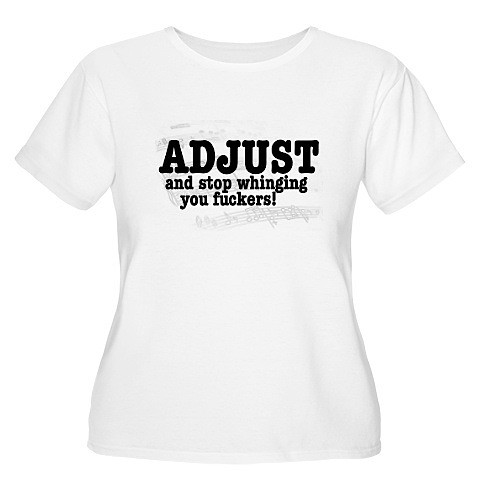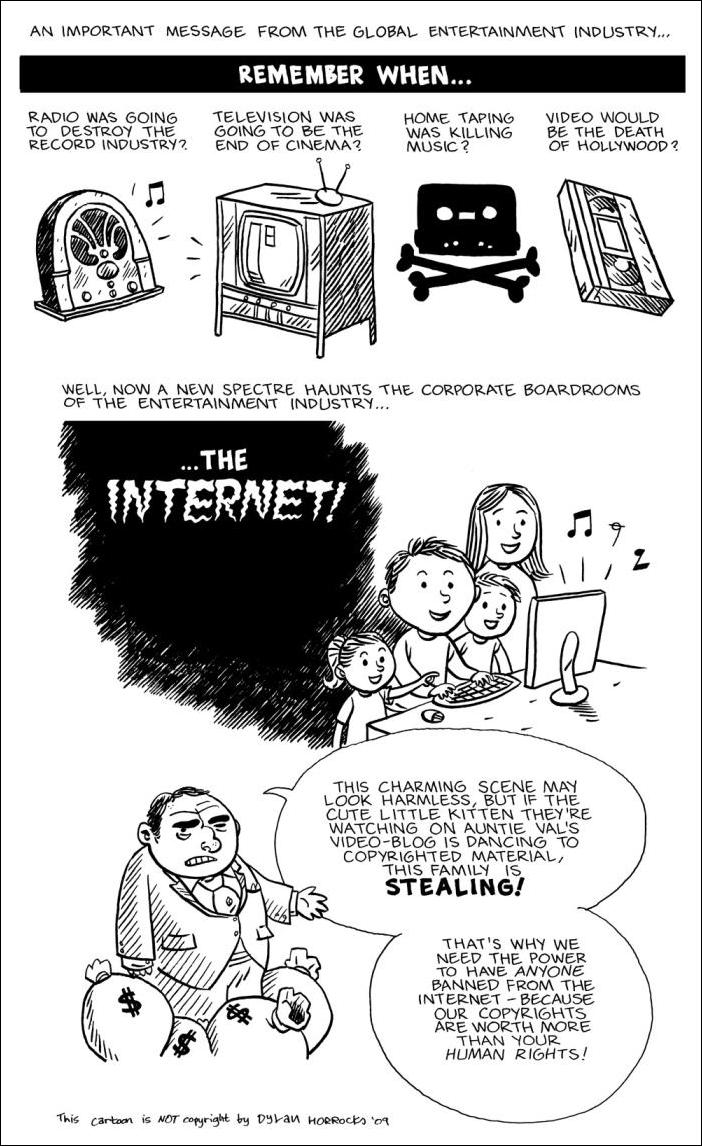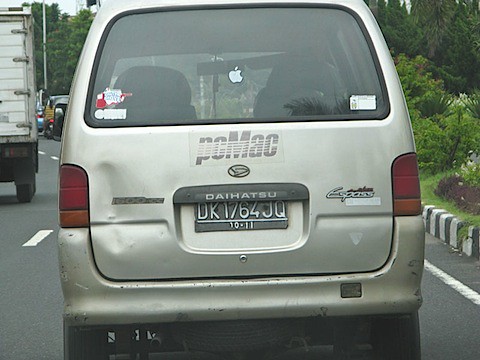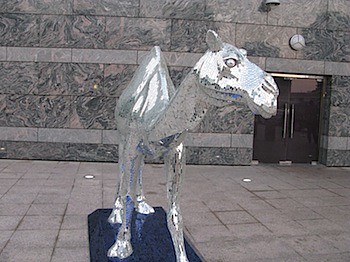Mark Harris has a fascinating post which goes through some of the rather ugly and unseemly machinations which led to the introduction of the ethically questionable (to say the least) Section 92 (A) amendment to the NZ Copyright Act into the lawbooks of my homeland.
I’m gonna sidestep a few of the issues, especially the gnarly legal and ethical ones as they seem to have been both discussed and re-discussed in some detail, and are simply disturbing.
Instead I’m wanting to make a quick comment about the less talked about ramifications of this act.
Which is the stupidity angle.
Or, the angle perhaps better called the Haven’t-they-fucking-learned-anything-endgame.
Because, from a copyright holder’s POV that’s the one that’s smacking me most in the face right now.
When I was a lad (I always love writing that line) record companies were mostly uber cool. There was a kind of romance about the music industry. You either wanted to be an All Black (not me), an aviator (for a brief moment), a pop star (no talent) or work for a record company (oh yes…).
Switched on people, hanging out with pop stars (good for kids like me who were tone deaf, or had been dismissively accused by our guitar teacher of trying to strangle the Yamaha six string, just before he gave up), making records and living a showbiz life…I wanted to be one of those.
And with that in mind, still as a lad, I went to see the legendary Phil Warren in his brightly coloured office above Cook Street Market in Auckland, complete with photos of pop stars on the walls above the purple vinyl sofas, and said “I wanna be in the music business”. His advice was simply to follow my instincts and if it was to be, it would be. It was.
Over the years I was fairly heavily involved in making records, signing and managing acts and running labels, the industry remained reliably cool. I used to get, until a few years back, other lads (and lasses) coming to me and asking if they too could get into the industry. I simply passed Phil’s advice on. One of those asking runs a major label now so Phil’s advice seems to have had some legs.
People wrote fantastic books on record labels, like the one on the Warners group, or the great Jac Holzman’s book on his legendary Elektra. Labels were anthologised, trainspotted, and the aura of romance, despite its overwhelmingly rose tinted façade, that wrapped around the legends of labels like Motown or Atlantic or Island remained largely intact.
That is, until about 10 years ago, when it all began to change. There were a few things that caused the swell of change in the way labels were and are perceived. At its most basic level the structure of record labels and the personalities that drove them changed. The old guard, the Berry Gordys, Chris Blackwells, and Ahmet Erteguns were replaced by accountants, Wall Street, and faceless bureaucrats who not only didn’t really understand the business they ran, and the passions that drove it, but saw an overwhelming need to cut a profit in the current financial year and were thoroughly overwhelmed and confused by the trees in front of the forest.
But, that in itself wasn’t enough to completely kill the aura. After all record labels still released groovy records by groovy artists.
Then came Napster and it’s aftermath. It was the beginning of an extended period where the largely faceless automatons who now controlled the shrinking number of labels decided to not only bite, but quite viciously attack the hand that feeds. The assault on the downloaders, the disc copiers and the grossly excessive verbiage that accompanied it all has been documented repeatedly, and I don’t need to go into it again but it, as it always was going to, it ended up turning the way the consuming public saw the labels, who were now fairly universally regarded as irredeemably greedy, exploitative and evil.
Thus the RIAA achieved the exact opposite result it intended to and provided a justification, however real, in the minds of those who wanted to take the copyrighted material owned by their members without payment.
And it also missed the point that whatever the downside of digital age vis-à-vis P2P and such, there were as many upsides for copyright owners in terms of massively increased opportunities for sync, catalogue exploitation, marketing and so much more.
Spin forward to 2008 and the penny has finally dropped, at least a little, in the USA. Whilst the ludicrous claims as to the losses incurred continue, and the likes of John Kennedy continue to stridently argue that it’s all about protecting the artist (really? Gosh!) the RIAA announced a moratorium on the silly granny suits and attacks. Maybe they’ve just worked out that there is some sort of future out there, if only they were willing to work through these things.
So flip across to New Zealand and what do we have…. a PR disaster carefully, and rather obliviously put together by a variety of industry lobby groups, including APRA, who having seen their turnover rise in the digital age, should know much better. And the balance of income from copyright exploitation will continue to shift in the direction of publishing and non-sales related returns.
Hell, everyone can work that one out, surely.
I can almost understand the remnants of the majors in NZ fighting tooth and nail to preserve what they have but the Canute-ism of it all is rather unavoidable and it is, in every way possible, as big a public relations disaster for the labels (at least on a NZ level) as the law suits against kids were in the USA, and thus is equally as self defeating as those ludicrous legal missteps.
They hated you before? They hate you much more now. How bloody stupid.
Anyway, as an aside, Mark has the T-shirt pictured here available. The phrase on it was lifted from a post of mine on Public Address and Mark, after asking permission, initiated the bits for sale at the link. I’m not sure if the phrase carried copyright ;)












